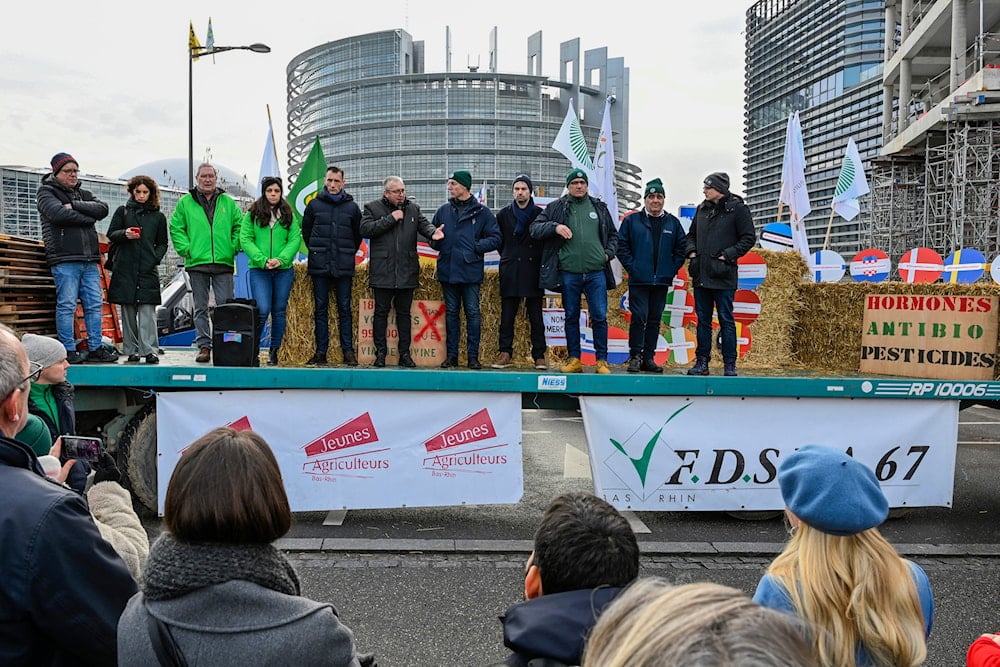French farmers plan nationwide protest over trade, food sovereignty
French farmers, led by FNSEA, plan a nationwide protest on September 25 against the EU-Mercosur trade deal and global competition.
-

French farmers protest against the Mercosur agreement outside the European Parliament, Wednesday, Jan. 22, 2025, in Strasbourg, eastern France. (AP)
France’s most powerful farming union, the FNSEA, has called for a nationwide day of action on Friday, September 25, thereby turning up the pressure on the country’s new prime minister, Sebastien Lecornu.
The union’s president, Arnaud Rousseau, told Le Journal du Dimanche that farmers would take to the streets across all departments to protest against what they see as unfair global competition. The main targets are the EU’s trade pact with South America’s Mercosur bloc, the tariffs slapped on French exports by US President Donald Trump, and what Rousseau described as “a flood of international imports that do not respect our standards."
The timing couldn’t be trickier for Lecornu, as the French government is already bracing for a day of strikes and demonstrations organized by French trade unions on September 18, and just a week later, farmers will be out in force, adding a fresh layer of pressure on the fledgling prime minister.
At the heart of the FNSEA’s anger is the EU–Mercosur agreement, which the European Commission signed off earlier this month, and while the text offers potential limits on certain agricultural imports in an effort to soothe French concerns, Rousseau insists it still undermines local producers, stating, “We want guarantees that our sovereignty, especially food sovereignty, will be protected.”
Unlike other unions, the FNSEA skipped the nationwide mobilization on September 10, with Rousseau arguing, “We didn’t take part simply because farmers are working!”, as he pointed out that grape harvests are still underway, herds are on their summer pastures, maize and beet crops are being gathered, and cereal sowing has begun.
Asked what he expects from Lecornu, Rousseau stated, “I want from Mr Lecornu what I already expected from his predecessors: a roadmap to lift French agriculture out of doubt and give us the means to invest and innovate, so that we can guarantee the country’s sovereignty – above all its food sovereignty.”
Protests take over France
This closely follows intense protests in France under the "Block Everything" banner, where nearly 200,000 people demonstrated against government budget reforms.
French Interior Minister Bruno Retailleau noted that young people were “particularly represented” in the nationwide movement, while accusing far-left and ultra-left groups of hijacking the protests. Despite “very, very numerous attempts” to disrupt daily life, he insisted that “blockers did not block France.”
In Paris, clashes erupted near key sites including Porte d’Aubervilliers, several high schools, and the Gare du Nord train station. Police used tear gas to disperse crowds, and multiple trash bins were set ablaze.
The unrest extended beyond the capital, impacting air travel as the Directorate General of Civil Aviation reported delays and cancellations at airports in Marseille, Nice, Bastia, Ajaccio, Figari, and Calvi.
Authorities launched an exceptional security operation, deploying 80,000 police officers and gendarmes supported by drones, helicopters, and armored vehicles, and Retailleau instructed security forces to “intervene quickly and be agile” to prevent blockades of strategic infrastructure.

 3 Min Read
3 Min Read










